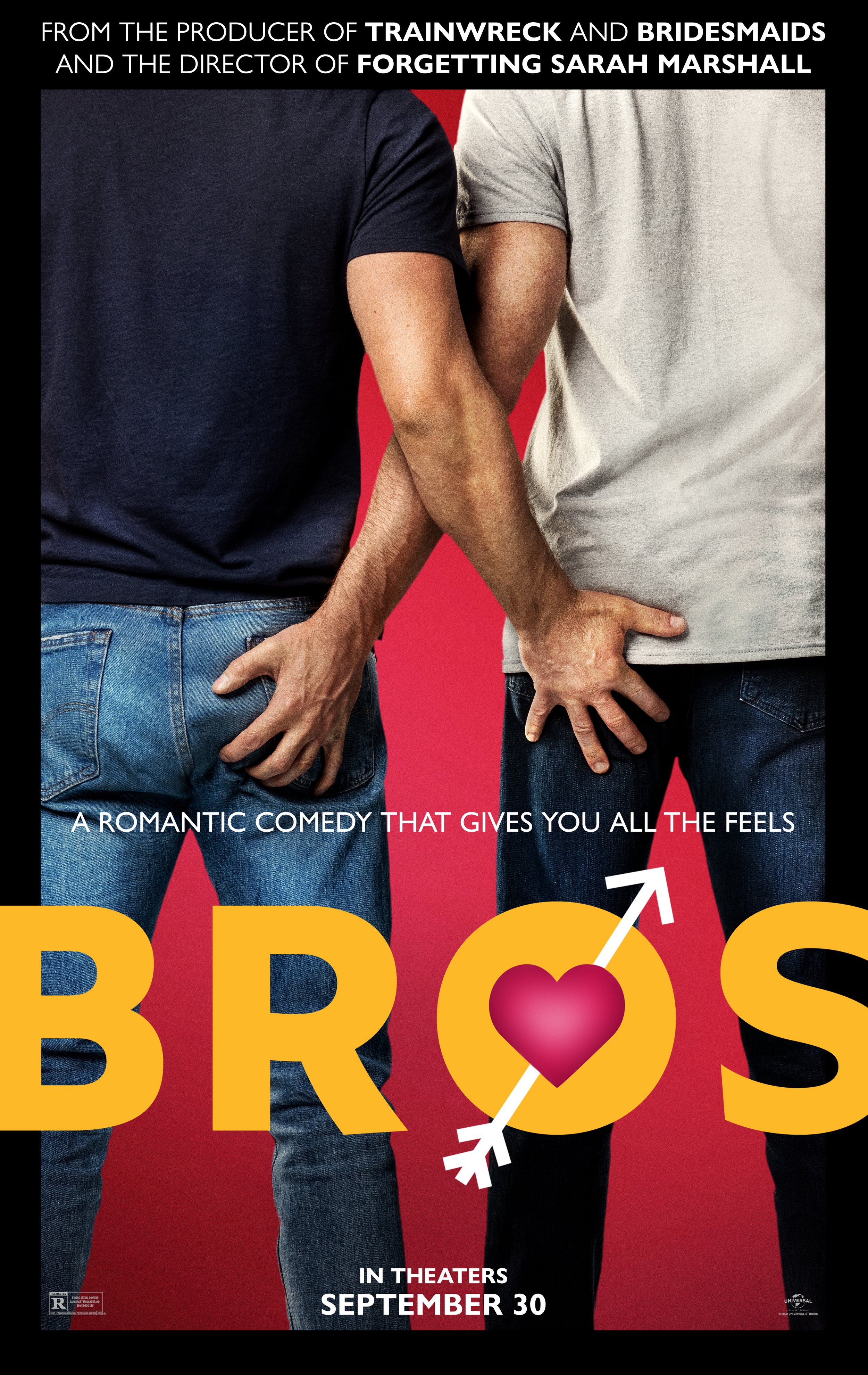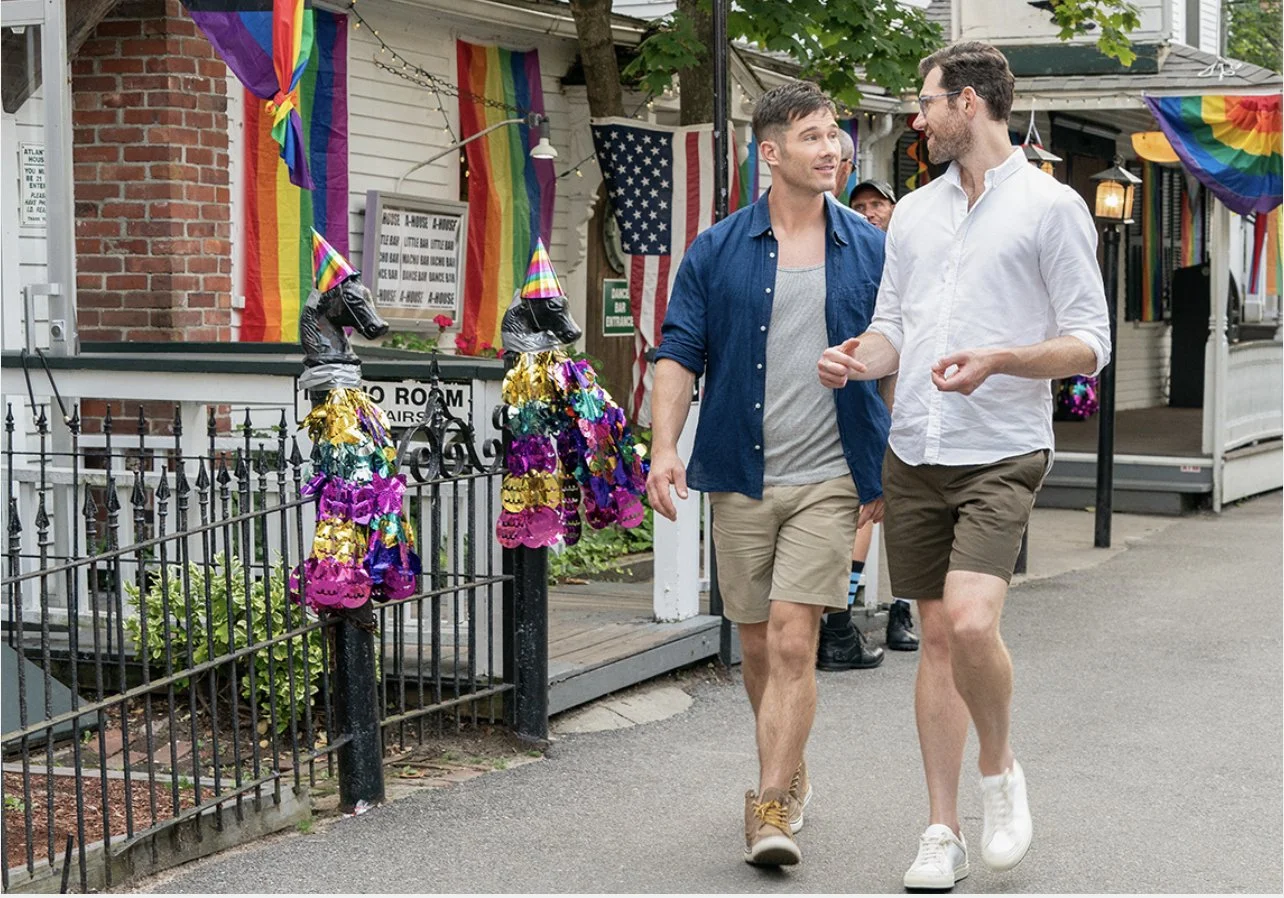FILM REVIEW: BROS
When Hairy Met Slutty: The unlikely romance of BROS is its blindspot, but the jokes come fast and furious
by Arnold Wayne Jones
Sometimes, the aggressive marketing of a project can actually undermine our confidence in it.
Take Bros. When we first saw the trailer? Pure delight. But in the intervening months, we’ve been inundated by a a chorus reminding us that this is the first mainstream/sex-positive/big-budget/alphabet-inclusive/majority gay cast/R-rated/Hollywood studio-backed/wide-release/yadda yadda/adult gay rom-com EVER!!!! Subtext: It doesn’t matter if it’s good – it’s important. You do want to encourage gay cinema, don’t you? You’re expected to see it, to say you like it, and bring your friends to see it again… all in solidarity. Being entertaining almost seems incidental to our supporting it. And how can we really know if it’s any good, if the messaging is so unrelentingly politicized?
Courtesy of Universal Studios
So I was more than a little relieved when I ended up genuinely enjoying Bros as much as a I did. Important? Meh. It’s not the 1990s anymore; we are not starved for gay stories –any gay stories – that we will hungrily pretend to like dreck just so that we don’t have withdrawl. We’re post-Brokeback, post-Moonlight, post-Will & Grace. Even straight rom-coms find avenues of gay outreach. The bar has been raised. And for the most part, Bros sails over the bar like an Olympic pole-vaulter.
The premise is pretty standard in a heteronormative-cliche kinda way: Bobby (Billy Eichner) and Aaron (Luke Macfarlane) are two strands in the late-Gen-X DNA of gay dudes: Both excrutiatingly single to the point of relationship-phobic, but with very different vibes: Bobby is the cynic who thinks marriage is actually some kind of punishment for straight folks and gays should embrace their outsider status; Aaron is the meaningless-hookup gym-rat whose serial anti-monogamy gets him laid without commitment.
Courtesy of Universal Studios
Yet both are also walking contradictions: For all his disparagement of mainstream culture, Bobby – an erstwhile podcaster now tasked with running a yet-to-open gay history museum – is filled with righteous anger that gay stories haven’t been drilled into the culture like Washington chopping down a cherry tree or Betsy Ross sewing the flag. He’s determined that the museum will not be fun, but confrontational to the point of chastising. In the words of Sally Field, he wants you to like him, to really like him … and what he represents, which is kind of pill-ish. Aaron, on the other hand, has a sensitive side that isn’t served by the soullessness of Grindr dates. He’s a dull estate lawyer who dreams of something more satisfying; even his ripped body isn’t enough.
Courtesy of Universal Studios
The men more-or-less quickly meet up with the agreement that neither, heaven forbid, wants a relationship. It’s When Hairy Met Slutty. But because it is a rom-com, can there be any doubt where they will eventually end up?
The most convincing thread of the plot is the “com” side: The script, co-written by director Nicholas Stoller and Eichner himself, is dense with smart, and smart-alecky, one-liners. Many of the characters, even the small ones or walk-ons by the likes of Debra Messing, are sharply drawn and get their share of zingers. And even when the jokes thin out, the wise observations of gay culture are handled perfectly (for instance, when friends announce they are in a trouple, it’s played less as scandalous than as a lot of work; at the end, the three are still together, without judgment).
Courtesy of Universal Studios
It’s the rom that could have used a little tweaking. A downside of the screenplay is something that often arises when the writer is also the star: A tendency to make his character “right.” A major conflict is Aaron asking Bobby to “tone down” his excessive Bobby-ness when they hang out at Christmas with Aaron’s family. Rather than comply, Bobby intentionally antagonizes them until Aaron snaps out of embarrassment. It’s played as “never ask a gay man not to be himself” – that the initial request was the original sin – when, for me, it was more “you don’t have to have an opinion about everything and argue with my elderly parents out of spite.” The script almost never leaves Bobby in the wrong, even when he clearly is (such as his dictatorial attitude about the museum exhibits; he physically assaults his subordinates yet they apologize to him). Bobby is just a bit too sanctimonious, even when he’s right, to make us really believe Aaron would want him… or want him back.
Courtesy of Universal Studios
And that’s where the casting of Macfarlane proves to be Bros’s nuclear weapon. Macfarlane is shredded and gorgeous, simultaneously boasting smiling eyes that could melt gold, nipples that could cut glass and a sincerity that sells even the most unlikely twists. You totally buy why Bobby – who objects to the roided out pretty boy culture – would nonetheless be drawn to Aaron, and less understand why the feelings are mutual. Except that you do, because Macfarlane makes you.
The film is produced by Judd Apatow, and it reeks of his brand: the funny, quasi-explicit sex scenes, the raunchiness, the outrageously inappropriate anything-for-a-laughisms. But if it seems formulaic, hey, so is Coca-Cola, and who can resist a Coke?
Courtesy of Universal Studios
Peopled with a diverse cast of queer, trans, genderfluid actors – many even in the “straight” roles – Bros ultimately is kinda important. I’m not convinced because some suits at Universal greenlit a film they thought they could make money on, but because a joke-rich comedy delivers the goods …. and we don’t have to endure a bunch of cis-women whining to their girlfriends; we get abs and furry asses. That’s the step in the right direction.
Opens wide on Sept. 30







